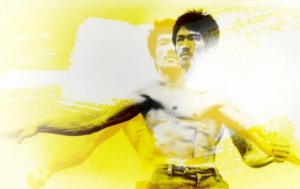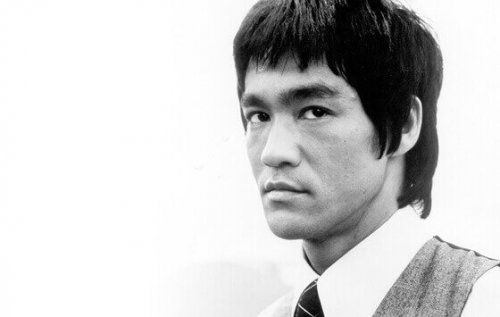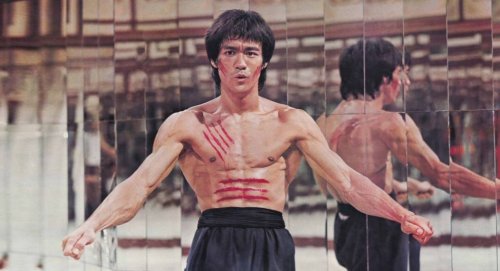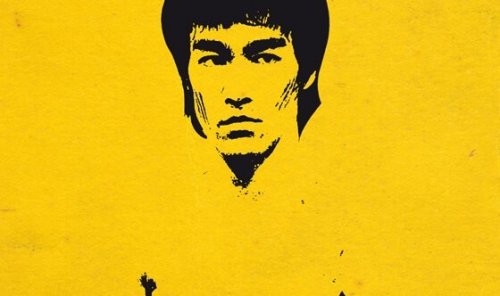7 of Bruce Lee's Mental Exercises

Bruce Lee’s mental exercises were everyday practices he did to maintain his abilities as a philosopher and martial arts master. Although he’s mostly known as an action film actor, Lee was much more than that. He was actually a teacher in the art of living.
Bruce Lee is considered the first great exponent of martial arts. Before him, no one really knew much about those practices that involved the mind more than the body. It was Bruce Lee who made them popular all over the world.
Bruce Lee’s mental exercises were routines that allowed him to strengthen his body, spirit, and overall life. He used to take a notebook with him everywhere he went where he’d write down his thoughts and the information he wanted to remember. That notebook showed the world Bruce Lee’s mental exercises.
1. Power of will
One of the most important mental exercises was the one he did every day to strengthen his power of will. He called it “the supreme court over all other departments of my mind”. By this, he meant that power of will was the force that determined everything else in life. To exercise his power of will, Lee set daily goals.
“Knowing is not enough, we must apply. Willing is not enough, we must do.”
-Bruce Lee-

2. Bruce Lee’s mental exercises on emotions
Bruce Lee knew the powerful effect emotions had on behavior. He knew positive emotions strengthened the spirit, while negative emotions weakened it. That’s why he always worked on transforming what he felt at any given moment.
His goal was to dilute negative emotions or turn them into something that contributed positively to his development. At the same time, he continued to cultivate positive emotions more and more since, according to him, that’s where personal strength resides.
3. Reason
Bruce Lee’s mental exercises on reason were aimed at making the latter the fundamental life guide. He always sought to filter out his thoughts to make good decisions.
4. Imagination
Imagination is what allows us to design and create mental scenarios. We sometimes waste it by using it only to feed fears or dream about our personal goals. When you do this, you’re not using your imagination to its maximum potential.
For Bruce Lee, imagination was the basic component of action plans. Reason gives a purpose and goal we should follow. Imagination makes us see the multiple ways and means that can help us achieve what we want.
“Art requires imagination. It requires creativity. Creativity requires experience and experience comes from your life. And your life is expressed in your art.”
-Bruce Lee-

5. Memory
Bruce Lee sought to focus the power of will, emotions, reason, and every personal resource towards the achievement of a previously set goal.
Memory is a tool that allows us to remember what we’re fighting for. Not only that, but it also reminds us of the paths that lead to the achievement of our goals, as well as the emotions and thoughts that we must keep in mind in order to make that happen.
6. The unconscious
For Bruce Lee, there was a greater goal in life, the main purpose that must become the axis of all the other minor objectives. This main purpose comes from the deepest part of ourselves: our unconscious.
Hence, one of Bruce Lee’s mental exercises was based on navigating the unconscious in order to unveil the intuitive image that held our main purpose in life. Thinking about that mental image every day will help bring all our personal resources together and use them to our favor.
7. The conscious
The conscious also played a big role in Bruce Lee’s mental exercises. He believed that consciousness was deeply connected to the ethics of action. In his notes, he said that one of his wishes was “to combine justice with mercy in my judgments” to be able to tell right from wrong.
Once he clarified what was good and what wasn’t, he promised himself to stick to doing the right thing regardless of the consequences that it implied.

“Absorb what is useful, discard what is useless, and add what is specifically your own.”
-Bruce Lee-
Bruce Lee’s mental exercises were everyday practices he did to maintain his abilities as a philosopher and martial arts master. Although he’s mostly known as an action film actor, Lee was much more than that. He was actually a teacher in the art of living.
Bruce Lee is considered the first great exponent of martial arts. Before him, no one really knew much about those practices that involved the mind more than the body. It was Bruce Lee who made them popular all over the world.
Bruce Lee’s mental exercises were routines that allowed him to strengthen his body, spirit, and overall life. He used to take a notebook with him everywhere he went where he’d write down his thoughts and the information he wanted to remember. That notebook showed the world Bruce Lee’s mental exercises.
1. Power of will
One of the most important mental exercises was the one he did every day to strengthen his power of will. He called it “the supreme court over all other departments of my mind”. By this, he meant that power of will was the force that determined everything else in life. To exercise his power of will, Lee set daily goals.
“Knowing is not enough, we must apply. Willing is not enough, we must do.”
-Bruce Lee-

2. Bruce Lee’s mental exercises on emotions
Bruce Lee knew the powerful effect emotions had on behavior. He knew positive emotions strengthened the spirit, while negative emotions weakened it. That’s why he always worked on transforming what he felt at any given moment.
His goal was to dilute negative emotions or turn them into something that contributed positively to his development. At the same time, he continued to cultivate positive emotions more and more since, according to him, that’s where personal strength resides.
3. Reason
Bruce Lee’s mental exercises on reason were aimed at making the latter the fundamental life guide. He always sought to filter out his thoughts to make good decisions.
4. Imagination
Imagination is what allows us to design and create mental scenarios. We sometimes waste it by using it only to feed fears or dream about our personal goals. When you do this, you’re not using your imagination to its maximum potential.
For Bruce Lee, imagination was the basic component of action plans. Reason gives a purpose and goal we should follow. Imagination makes us see the multiple ways and means that can help us achieve what we want.
“Art requires imagination. It requires creativity. Creativity requires experience and experience comes from your life. And your life is expressed in your art.”
-Bruce Lee-

5. Memory
Bruce Lee sought to focus the power of will, emotions, reason, and every personal resource towards the achievement of a previously set goal.
Memory is a tool that allows us to remember what we’re fighting for. Not only that, but it also reminds us of the paths that lead to the achievement of our goals, as well as the emotions and thoughts that we must keep in mind in order to make that happen.
6. The unconscious
For Bruce Lee, there was a greater goal in life, the main purpose that must become the axis of all the other minor objectives. This main purpose comes from the deepest part of ourselves: our unconscious.
Hence, one of Bruce Lee’s mental exercises was based on navigating the unconscious in order to unveil the intuitive image that held our main purpose in life. Thinking about that mental image every day will help bring all our personal resources together and use them to our favor.
7. The conscious
The conscious also played a big role in Bruce Lee’s mental exercises. He believed that consciousness was deeply connected to the ethics of action. In his notes, he said that one of his wishes was “to combine justice with mercy in my judgments” to be able to tell right from wrong.
Once he clarified what was good and what wasn’t, he promised himself to stick to doing the right thing regardless of the consequences that it implied.

“Absorb what is useful, discard what is useless, and add what is specifically your own.”
-Bruce Lee-
All cited sources were thoroughly reviewed by our team to ensure their quality, reliability, currency, and validity. The bibliography of this article was considered reliable and of academic or scientific accuracy.
Fajardo, T. G. (2009). Los principios filosóficos de Bruce Lee, aplicados a la pedagogía. Ars Brevis, (15), 81-91.
This text is provided for informational purposes only and does not replace consultation with a professional. If in doubt, consult your specialist.







